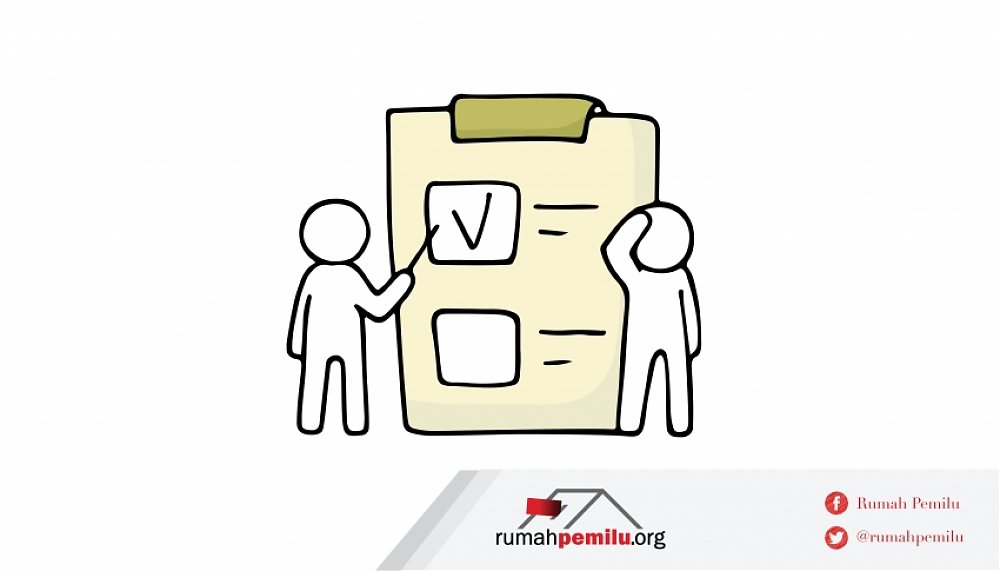Are there seeds of voter suppression in Indonesian elections? What are the tendencies of the forms?
The right to vote is one of the political rights guaranteed by the constitution. In the context of elections, there is a "general" principle as stated in Article 22E paragraph (1) which reads, "General elections are held in a direct, general, free, secret, honest and fair manner every five years." The general principle means that every citizen who meets the requirements has the right to vote. Regarding the understanding of this general principle, several election laws emphasize that all citizens who meet the requirements are entitled to participate in elections.
In practice, a person's right to vote is often interfered with. Systematic attempts to deter voters from voting for candidates always appear in elections. Voter suppression has been around for a long time in the United States election. There are many examples of voter suppression in the course of this country's democracy, ranging from stricter requirements to register as voters, to new forms of voter suppression that use technology to manipulate voter behavior or hoaxes that are spread to deceive voters so that voters are reluctant to cast their ballots.
Voter suppression or interference with the right to vote can be defined as an attempt to eliminate the right to vote for a particular person or group of voters. Interference with the right to vote is carried out by preventing certain voters or groups of voters from being registered as voters and/or not exercising their right to vote on polling day. (Daniels, 2010).
Three forms of interference with the right to vote in Indonesian elections
In Indonesia, in the 2019 Elections and 2020 Regional Head Elections (Pilkada), there were at least three forms of interference that could be identified as interference with the right to vote. First, discrimination in election regulations. Second, interference with the right to vote. Third, the confusion of election information. Cases in these three categories were identified as interference with the right to vote because it has the potential to eliminate one's right to vote.
Regarding the first form, discrimination in regulations, there are three provisions in the Indonesian election law that have the potential to eliminate a person's right to vote. The provision for having an e-KTP as a condition for registering as a voter has marginalized people who do not have an e-KTP. People who do not have an e-KTP, even though they have fulfilled the requirements to vote, cannot be registered as voters and therefore cannot participate in voting. Provisions regarding not being mentally/memory disturbed as a requirement to be registered as a voter have also excluded people with mental disorders from the voter registration process. In addition to the two conditions for registering as a voter, there is also a provision regarding moving to vote which administratively makes it difficult for groups of people with limited mobility to manage it. In the case of transfer voters who lose their voting rights for certain elections, these voting rights should be accommodated if there is a voting method other than voting at the TPS. Special voting arrangements (special voting arrangements) are designed to expand the opportunities for voters to cast their ballots and thereby facilitate the principle of universal suffrage.
Regarding the second form, intimidation and interference with the right to vote, there are three cases that have great potential to eliminate the right to vote. First, intimidation with a twist of hatred. Second, interfere with the right to vote for people with mental disorders. Third, intimidation of factory workers. Intimidation and bullying is closely related to the relationship of influence and power. Parties with stronger influence and power intimidate those with weaker influence and power or have no power at all. Intimidation is carried out by parties who have power to vulnerable and subordinated parties.
Regarding the third form of interference, election information tampering, three things were identified as interference with the right to vote. First, the limited election information. Limited information will make a person vulnerable to the second form of interference, namely the obscuration of information or disinformation of technical election procedures. Several themes of disinformation on technical election procedures include disinformation regarding technical voting; the requirements of the documents that must be brought to be able to vote at the TPS; voting time; and other topics related to the conduct of voting. Third, disinformation that delegitimizes the electoral process also has the potential to eliminate a person's right to vote.
Many efforts have been made to overcome interference with the right to vote. Regarding discriminatory provisions in regulations, efforts such as judicial review to the Constitutional Court and interpretations to make technical regulations more inclusive have been taken. The election law has also provided for dealing with interference with the right to vote. Intimidation and other efforts to eliminate the right to vote are categorized as election crimes. Regarding the form of confusion of election information, efforts such as digital literacy, providing adequate election information, and taking action against disinformation have been carried out. However, none of these efforts are specifically focused on protecting a person's suffrage. Special protocols for handling disinformation that can eliminate a person's right to vote are urgently needed.
MAHARDDHIKA & NURUL AMALIA SALABI
This paper is the opening of a series of articles on mapping the forms of voter suppression or interference with the right to vote in Indonesian elections. Check out the articles in this series:











